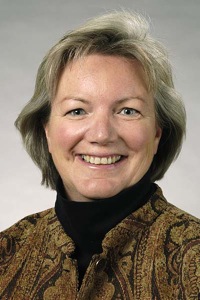Five questions: Pharmacy dean sees school’s reputation thrive
Jeanette Roberts, dean of the School of Pharmacy, understands the importance of reputation as well as anyone.
She spent 15 years as a member of the faculty at the University of Utah College of Pharmacy before making the move to Wisconsin in 2003.
“When Madison calls, people listen,” Roberts said.

Roberts
Building on that reputation has been no small part of her agenda since that call came in. Recent U.S. News rankings of graduate programs put UW–Madison’s pharmacy programs fifth among more than 100 — up from ninth, leapfrogging pharmacy programs at Ohio State University and the University of Michigan.
Inside UW: How does a school like Pharmacy build its reputation?
Roberts: It speaks of the reputation of our faculty, staff and students and especially to our alumni, and I’d like to congratulate and thank to whole School of Pharmacy family for that. I was just talking to someone from a new pharmacy school that just graduated their first class. They have 90 alumni now. We have 8,000 living alumni, and they’ve had incredible impact the science and practice of pharmacy — wherever they go. That turns into clinical training sites, guest lecturers, mentors for our students and donor support. It’s a huge network of people that do so many things for the school.
Inside UW: What are the challenges facing your students as they move on to professional careers?
Roberts: We’re all familiar with the economic issues in health care. Our grads often feel shut out from doing creative things because of the bottom line, and why spend your time on anything but putting pills in a bottle when that’s what you’re paid to do? But the practice is shifting from dispensing roles into more drug information and medication management, especially with complex patients.
Inside UW: How do you prepare students for a changing work environment?
Roberts: On top of the scientific foundation and clinical skills, it’s more and more important to instill in students the desire to keep learning, keep changing, expanding and being open to new ideas. You want them to be open to innovation in their field, maybe even to opening their own business or launching their own product. The idea of adapting to future opportunities and change is what we hope they’ll keep in mind. Even though they may be worn down working 13-hour shifts, we want them to be thinking, “How do we change the profession for the better?”
Inside UW: How do you balance the school’s educational mission with maintaining a prominent research program?
Roberts: The two can’t be separated. They are mutually reinforcing. I don’t want our faculty to feel like they have to stop seeing patients to do their research or put down their research to teach about something else. It’s all a continuum, and the benefit is the students are learning from the people who are creating the science and technology and drugs of the future. You don’t get that at a school with little or no research mission.
Inside UW: Does that carry over into partnerships with other disciplines on campus?
Roberts: I can’t think of anybody in the school who doesn’t have interdisciplinary connections. The biggest would be with the Carbone Cancer Center, and the Institute for Clinical and Translational Research is a big way we interact with other parts of campus. Unit-to-unit we have so many relationships with chemistry, biochemistry, bacteriology, engineering. That’s the way science is done now, and the way we like to approach improving all aspects of our school. We like to pull together to find creative ways to meet our goals.
Tags: School of Pharmacy



